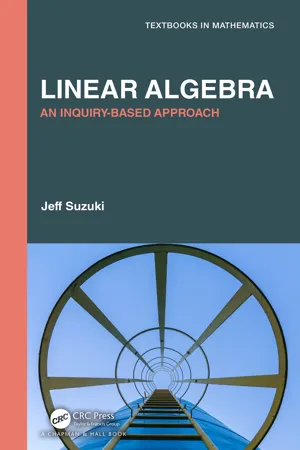
- 348 pages
- English
- ePUB (mobile friendly)
- Available on iOS & Android
About this book
Linear Algebra: An Inquiry-based Approach is written to give instructors a tool to teach students to develop a mathematical concept from first principles. The Inquiry-based Approach is central to this development. The text is organized around and offers the standard topics expected in a first undergraduate course in linear algebra.
In our approach, students begin with a problem and develop the mathematics necessary to describe, solve, and generalize it. Thus students learn a vital skill for the 21st century: the ability to create a solution to a problem.
This text is offered to foster an environment that supports the creative process. The twin goals of this textbook are:
•Providing opportunities to be creative,
•Teaching "ways of thinking" that will make it easier for to be creative.
To motivate the development of the concepts and techniques of linear algebra, we include more than two hundred activities on a wide range of problems, from purely mathematical questions, through applications in biology, computer science, cryptography, and more.
Table of Contents
Introduction and Features
For the Student . . . and Teacher
Prerequisites
Suggested Sequences
1 Tuples and Vectors
2 Systems of Linear Equations
3 Transformations
4 Matrix Algebra
5 Vector Spaces
6 Determinants
7 Eigenvalues and Eigenvectors
8 Decomposition
9 Extras
Bibliography
Index
Bibliography
Jeff Suzuki is Associate Professor of Mathematics at Brooklyn College and holds a Ph.D. from Boston University. His research interests include mathematics education, history of mathematics, and the application of mathematics to society and technology. He is a two-time winner of the prestigious Carl B. Allendoerfer Award for expository writing. His publications have appeared in The College Mathematics Journals; Mathematics Magazine; Mathematics Teacher; and the American Mathematical Society's blog on teaching and learning mathematics. His YouTube channel (http://youtube.com/jeffsuzuki1) includes videos on mathematical subjects ranging
from elementary arithmetic to linear algebra, cryptography, and differential equations.
Tools to learn more effectively

Saving Books

Keyword Search

Annotating Text

Listen to it instead
Information
1
Tuples and Vectors
1.1 Tuples
Name: Jeff Suzuki | Gender: M |
|---|---|
Height: 5’6” | Weight: 135 |
BP: 130 over 70 | Age: 37 |
Table of contents
- Cover
- Half Title
- Series Page
- Title Page
- Copyright Page
- Dedication
- Contents
- Introduction and Features
- For the Student …and Teacher
- Prerequisites
- Suggested Sequences
- 1 Tuples and Vectors
- 2 Systems of Linear Equations
- 3 Transformations
- 4 Matrix Algebra
- 5 Vector Spaces
- 6 Determinants
- 7 Eigenvalues and Eigenvectors
- 8 Decomposition
- 9 Extras
- Bibliography
- Index
Frequently asked questions
- Essential is ideal for learners and professionals who enjoy exploring a wide range of subjects. Access the Essential Library with 800,000+ trusted titles and best-sellers across business, personal growth, and the humanities. Includes unlimited reading time and Standard Read Aloud voice.
- Complete: Perfect for advanced learners and researchers needing full, unrestricted access. Unlock 1.4M+ books across hundreds of subjects, including academic and specialized titles. The Complete Plan also includes advanced features like Premium Read Aloud and Research Assistant.
Please note we cannot support devices running on iOS 13 and Android 7 or earlier. Learn more about using the app